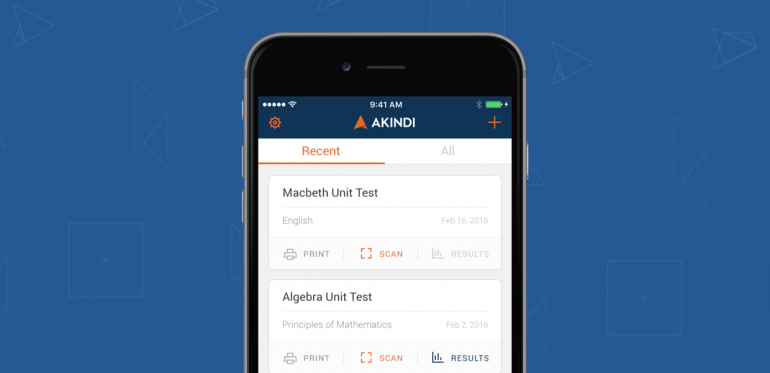Two Toronto-based startups have worked together to launch an app version of an edtech platform tackling a major pain point for teachers.
Akindi, a Toronto-based company that is automating the creation and grading of multiple choice assessments, has launched an iPhone app, designed by fellow Toronto startup Tiny Hearts. “The partnership allows Akindi to focus on adapting their technology to a mobile device while leveraging Tiny Hearts Studio’s expertise to ensure a great user experience,” said Robleh Jama, founder and CEO of Tiny Hearts.
Akindi’s platform — which the company calls a Scantron alternative — allows teachers to create their own customized assessments, including pre-filling student information. Teachers can then upload the sheets onto Akindi’s platform to be graded and receive insights like gaps in student understanding.
Until the company launched its mobile app, Akindi only supported scans from document scanners. This made it easy for large university and K-12 classes to get a large amount of stacks done quickly, but presented a challenge for smaller classes, where teachers had to wait until the end of the day to get sheets scanned. Currently, Akindi boasts clients like Harvard University, the University of Pennsylvania, Ryerson University, and George Washington University.
With the iPhone app, teachers can create, print, and scan sheets directly from the app and provide students with feedback instantly. The company says that teachers can then explain material to students when it’s still fresh in their mind, rather than the next day.
“We wanted them to get the data instantaneously so they can make the adjustments right there in the same class,” said Mahmoud Hashim, founder of Akindi. “With the app, the teacher is able to run a quick assessment and scan the sheets as they come in using their iPhone camera. By the time the last student submits their answers, the app would have calculated the results and displayed the questions and areas the class did and didn’t do too well on.”
The app allows teachers to teachers to take ownership over their teaching style; Hashim said that while teacher are quick to adopt emerging tech, school districts and universities are slower to purchase products that teachers may use more eagerly.
“With the proliferation of many more tools and apps outside of the big education vendors, schools aren’t sure which products suit their teachers best, and so they are looking for their teachers to provide that input and validation to ensure their dollars are truly well spent,” said Hashim.
At the same time, Hashim said that analytics and data like what Akindi provides is playing a bigger role in helping teachers help students; according to him, data alone is no replacement for a teacher’s ability to understand students and determine their needs.
“However, it certainly helps provide greater insight. Data is also playing a greater role because it helps communicate to all stakeholders where things are working and where they’re not. The challenge when it comes to analytics is providing it in a way that doesn’t overwhelm teachers to the point where it’s useless or unusable.”


